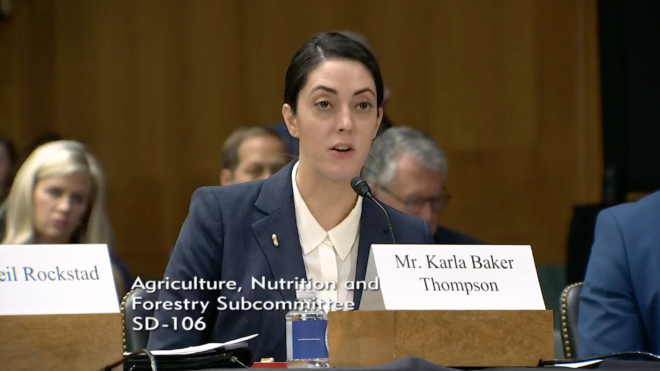Released: May 3, 2023
Washington, D.C. – The U.S. Senate Agriculture Subcommittee on Commodities, Risk Management, and Trade held a hearing on Tuesday, May 2, 2023, entitled “Commodity Programs, Credit, and Crop Insurance – Part 1: Producer Perspectives on the Farm Safety Net.” Representing the U.S. Peanut Federation was Karla Thompson of JET Farms Georgia and Integrity Farms in Camilla, Georgia.
Thompson’s testimony emphasized the priorities of the peanut industry for the 2023 Farm Bill, including an increase in the reference price for the Price Loss Coverage (PLC) Program. Inflation on key farm inputs, including fuel, fertilizer, and labor, have all contributed to the rising cost of production for peanut producers. According to Dr. Stanley Fletcher of Abraham Baldwin Agricultural College and Professor Emeritus at the University of Georgia, the 2021 cost of production was $545.97 per ton, and the 2022 cost of production is approximately $668 per ton.
During her testimony, Thompson gave anecdotal evidence supporting the rising cost of production, stating:
“On our farm alone, many of our expenses have almost doubled since 2018. Our fertilizer costs absolutely skyrocketed. We need certain fertilizers to sustain the right nutrient levels in the soil, both for the peanuts we are growing in any given season and to protect the land for the future. In the past few years, we have experienced seasons where we could barely obtain the necessary products due to supply chain issues. Supply shortages directly translated to price increases, and our fertilizer expenses have as much as doubled. Currently, fertilizer prices are changing week to week preventing us from making informed management decisions.
Labor costs have been especially challenging. We believe in taking care of our team and paying them fairly, so labor costs are a primary focus of our financial planning. Since 2018, it has become increasingly difficult to plan for and cover our labor costs. For example, we need skilled equipment operators to plant and harvest our peanuts safely and efficiently. Every year, it gets harder and harder to find local workers with those skills, and so we have come to rely on guest workers from Mexico that we recruit through the H2A visa program. The costs for the H2A program have always been high, but they have risen dramatically just this past year. In Georgia, the U.S. Department of Labor unexpectedly raised the H2A minimum wage by 14%, from $11.99 in December 2022 to $13.67 for 2023.”
Thompson also voiced the support of the U.S. Peanut Federation for a voluntary base update that includes growers with and without peanut base acres. While the 2014 Farm Bill allowed for base updating for peanut growers that already had base on their farms, it excluded many young farmers and new production areas.
During the hearing, Thompson answered questions from U.S. Senators Raphael Warnock,
D-Georgia, and Tommy Tuberville, R-Alabama, on the challenges that peanut producers are currently facing.
Senator Warnock commented, “Georgia accounts for almost half of the peanuts produced annually in the United States, and we are proud of that. That’s more than 2 billion pounds a year.” Senator Warnock asked Thompson to provide insight on the Marketing Assistance Loan (MAL) Program and peanut forfeitures.
According to Thompson’s testimony, “historically forfeitures [of peanuts] have been very low. They are typically under 5 percent. In 2017 and 2018 they were around 3 percent, in 2019 there were zero forfeitures, in 2020 it was .17 percent, and in 2021 there haven’t been any forfeitures on record. In response, Senator Warnock stated, “I take that as evidence that the Marketing Loan Program is working well for peanut farmers, and I look forward to supporting this program in this year’s Farm Bill.”
In addition to Thompson, Zippy Duvall, president of the American Farm Bureau Federation, and Rob Larew, president of the National Farmers Union, also testified, as well as representatives from other commodities including dry beans, sorghum, wheat, dairy, rice, cotton, soybean, sugar beet, and corn.
Watch the full hearing online at the U.S. Senate Committee on Agriculture, Nutrition and Forestry website at www.agriculture.senate.gov.
###
The United States Peanut Federation (USPF) is comprised of the Southern Peanut Farmers Federation, the American Peanut Shellers Association, and the National Peanut Buying Points Association. USPF serves as a unified voice in Washington, D.C. for all sectors of the peanut industry and advocates actively for strong agricultural policy. For additional information, please contact the USPF at (202) 543-7464.

